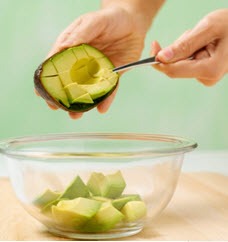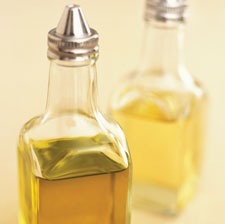Fats and Cancer: Part Three
July 1, 2014 | Author: Susan Silberstein PhDIn my previous blog in this series, I discussed some good and bad aspects of saturated fats, but even more relevant to our cancer risk is which unsaturated fats we choose and what we do to those fats.
Unsaturated Fats
 It is crucially important for cancer protection to differentiate among the unsaturated fats. Monounsaturates abundant in avocados, pine nuts and olives, are quite protective against cancer. In fact, the high oleic acid content of olive oil can reduce expression of the Her 2 breast cancer oncogene by as much as 70%.
It is crucially important for cancer protection to differentiate among the unsaturated fats. Monounsaturates abundant in avocados, pine nuts and olives, are quite protective against cancer. In fact, the high oleic acid content of olive oil can reduce expression of the Her 2 breast cancer oncogene by as much as 70%.
We also have to distinguish between the polyunsaturated fatty acids (PUFAs) known as omega-6 and omega-3.While we need both types in our diet, they need to be in the proper ratio. A preponderance of omega-6 fats tends to suppress immune function, whereas omega-3s tend to boost immune function. Most Americans consume an omega-6 to omega-3 ratio of about 25 or 30 to one – that is 30 to one against your immune system!
According to a 2010 report from the Institute of Food Technologists, as many as one out of every three cancer deaths in both humans and dogs could be prevented by reducing omega-6 fatty acids. Veterinarians Demian Dressler and Susan Ettinger, authors of The Dog Cancer Survival Guide, agree., Too much omega-6 and insufficient omega-3 can lead to inflammation, which creates an environment conducive to cancer. Excessive intake of omega 6 fatty acids also suppresses Natural Killer cells that are key to the body’s natural cancer fighting ability.
The foods highest in omega-6 fatty acids include soybean oil, sunflower oil, corn oil, safflower oil, and cottonseed oil. Dishes made with “pure vegetable oil” are very likely to be made with lots of omega-6! Avoid these.
The foods high in omega-3 fatty acids are wild fish, seaweed like kelp, wild game, grass-fed animals, free-roaming hens and their eggs, raw walnuts, and raw pumpkin, flax, hemp and chia seeds (fresh ground is best). Eat as many of these as possible.
Quality of Fats

Finally, the quality of fats is important. Oils, with the notable exception of coconut oil, are very unstable; they break down quickly when exposed to air, heat and light. Especially when they are heated, oils oxidize, turn rancid and produce free radicals – unstable molecules that are implicated in cellular DNA damage, aging and cancer.
Saturated fats are solid at room temperature and very stable. They resist oxidation, so they often can tolerate higher temperatures. Polyunsaturated fats, found in safflower and sunflower oils,are liquid at room temperature, oxidize easily, and are generally the least stable for cooking. Monounsaturated fats are generally more stable than polyunsaturates.
Hydrogenated fats or trans fatty acids are especially dangerous. Trans fats are chemically altered, man-made fats designed to make vegetable oils, which are normally liquid at room temperature, solid and more chemically stable. The hydrogenation process injects hydrogen into vegetable fats under high heat and pressure. This saturates what was previously an unsaturated fat and results in a chemical configuration that is not found in nature. Trans fats are abundant in margarine, many baked goods, and movie-house popcorn. Avoid them.
To summarize, a diet high in fat — especially cooked animal fat, fried foods, omega-6 oils, and hydrogenated fats — is a definite invitation to cancer. Lowering fat intake to 15-20% of total calories, increasing the omega-3 to omega-6 ratio, and reducing oxidized fats can drastically lower your risk for cancer or recurrence. And this program seems to be just as effective in reducing risk for obesity, diabetes and heart disease as it is for cancer!
Join the conversation: Ask Holistic Cancer Coach Facebook Group
References:
[1] Chilkov N. Avocados: A super cancer fighting food. Huffpost Healthy Living. June 24, 2014. http://www.huffingtonpost.com/nalini-chilkov/avocados-a-super-cancer-f_b_632985.html
[2] Dressler D and Ettinger S. Dog Cancer Blog. http://www.dogcancerblog.com/food-and-dog-cancer-omega-6-fatty-acids/
[3] http://www.westonaprice.org/health-topics/why-butter-is-better/
[4] Menendez JA et al. Oleic acid, the main monounsaturated fatty acid of olive oil, suppresses Her-2/neu expression. Annals of Oncology Jan 10, 2005
